Avoiding a Dead Sea
- Share via
The city of Los Angeles will have to make a considerable sacrifice to maintain a viable Mono Lake--which lies 300 miles to the north, at the far end of the city’s Owens Valley water system. But Mayor Tom Bradley has pledged to do so, and various groups are working to determine just how much water the city must give up to stabilize the isolated saline lake at the eastern foot of the Sierra Nevada.
A study released last week has come as close as any to pinpointing just what it will take to prevent Mono Lake from turning into a dead Great Basin sea, bereft of the teeming bird life and other natural features that make it unique--one of the most fascinating bodies of water in the nation.
Conducted by a UC Santa Barbara research institute, the study says that the lake’s ecosystem can be maintained if the lake is stabilized at an elevation of 6,382 feet above sea level, about four feet higher than the current level. To achieve that, the Los Angeles Department of Water and Power would have to give up more than half the 90,000 acre-feet of water that it has diverted, on the average, from the lake’s headwater streams each year. The lake level has dropped about 40 feet since diversions began in the early 1940s.
The UC Santa Barbara research generally supported the conclusions of previous work done by an arm of the National Academy of Sciences. The academy report said that the lake would decline 49 more feet if diversions continued, would stabilize at 6,330 feet, and essentially would be dead. Another study, being conducted by the U.S. Forest Service, also will try to establish a level at which the lake should be maintained.
The city estimates that it will cost more than $20 million a year to make up for the water losses proposed in the UC Santa Barbara report, with an additional $10 million in unrealized electric power generation revenues. The Department of Water and Power and the Mono Lake Committee, long-time foes in Mono Lake legal disputes, have engaged the Environmental Defense Fund to attempt to locate alternative sources of water.
The old days of easy water are over. The courts rightly have recognized the needs of the environment in the competition for scarce supplies. And both state and federal governments have established Mono Lake as a special natural wonder worthy of being maintained and preserved. Resolution of this issue will be costly to the city of Los Angeles, but all three levels of government have an interest in maintaining a healthy Mono Lake for future generations of Americans to enjoy. State and federal governments might even decide that it was only fair for each to bear a share of the cost.
More to Read
Sign up for Essential California
The most important California stories and recommendations in your inbox every morning.
You may occasionally receive promotional content from the Los Angeles Times.













![Vista, California-Apri 2, 2025-Hours after undergoing dental surgery a 9-year-old girl was found unresponsive in her home, officials are investigating what caused her death. On March 18, Silvanna Moreno was placed under anesthesia for a dental surgery at Dreamtime Dentistry, a dental facility that "strive[s] to be the premier office for sedation dentistry in Vitsa, CA. (Google Maps)](https://ca-times.brightspotcdn.com/dims4/default/07a58b2/2147483647/strip/true/crop/2016x1344+29+0/resize/840x560!/quality/75/?url=https%3A%2F%2Fcalifornia-times-brightspot.s3.amazonaws.com%2F78%2Ffd%2F9bbf9b62489fa209f9c67df2e472%2Fla-me-dreamtime-dentist-01.jpg)